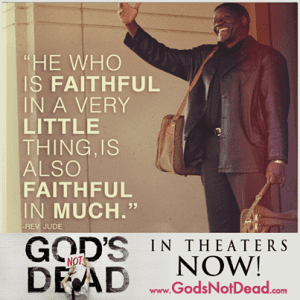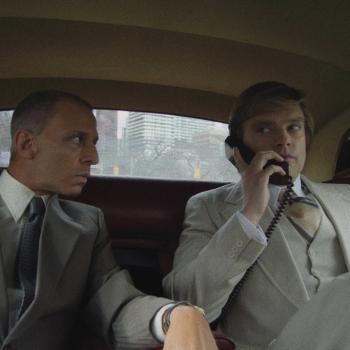I t is a massive privilege to be involved in helping promote the movie God’s Not Dead . I have met the producers, the author of the book that helped to inspire the movie, and several of the actors. All of them were committed Christians with the desire to see the gospel spread through Christians being provoked by God’s Not Dead.
t is a massive privilege to be involved in helping promote the movie God’s Not Dead . I have met the producers, the author of the book that helped to inspire the movie, and several of the actors. All of them were committed Christians with the desire to see the gospel spread through Christians being provoked by God’s Not Dead.
My other posts about God’s Not Dead
Personally I love the film. I am far from alone. A quick look at the Twitter hashtag for God’s Not Dead or it’s Facebook page reveals a constant stream of admirers. I have watched this in cinemas on both sides of the Atlantic, and each time throughout the film the audience has gasped, laughed, applauded, and in many cases cried.
Many have even gone so far as to say it was the best movie they ever watched. People report being powerfully affected. Some have even become Christians. I am sure that the film will fulfil a similar role to that once played by The Cross and the Switchblade for years to come.
I urge all Christians to watch this film if they haven’t already. It is a cultural phenomena that you should want to experience.
The Box Office results are quite simply incredible for an independent film made by a Christian company. In the USA the movie is nearing the end of its sixth week. It currently sits at No.8 in the secular charts, at one point having been inside the top three. It has overtaken the heavily promoted Noah in the charts demonstrating it has greater ongoing interest having been out a week longer. This film really has longevity.
In the UK, many chains believed it would not be successful. As a result it opened in just 20 cinemas, and yet for two weekends now it has been inside the top 20 of all films. In fact the second weekend showed 27% growth over the opening weekend, something which very rarely happens. By the end of last week it had taken $103,452 here. Thus, next Monday it will be showing in a number of additional cinemas. Even now, however, the chains are nervous as to whether the demand to watch this movie will continue to grow, and so in the case of the Vue they have only agreed to a single showing at this point. If you know a pastor in the UK, please do ask them to consider promoting this film on Sunday, and even showing the trailer. UK cinema listings can be seen here.
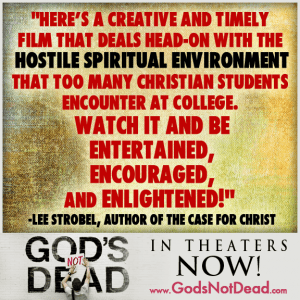 As I have previously written, one reason for God’s Not Dead is that it promotes a conversation about faith, that society is fast forgetting how to have.
As I have previously written, one reason for God’s Not Dead is that it promotes a conversation about faith, that society is fast forgetting how to have.
Yet despite this success the movie has received significant amounts of criticism from some. God’s Not Dead seems to arouse strong emotions. Perhaps the most extreme of these was a review in a left-wing UK newspaper, the Guardian, which roundly criticised the film concluding, “Ban this sick filth!” This perspective was far from alone, and the Rotten Tomatoes page demonstrates the dichotomy well. The critics score is a lowly 13%, although 86% of the audience liked it.
Many Christians have asked me why I think some secular film critics have responded in such a shrill way. To me the answer is simple: They hate us.
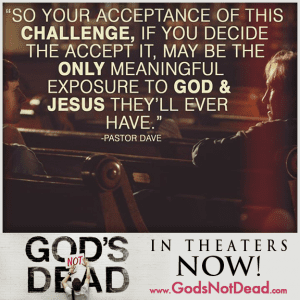 God’s Not Dead has also received some criticism from Christians. Some believe that it is not at all subtle, and is like a poke in the eye for atheists. The film does portray atheists in a negative light, with them showing direct discrimination and hostility towards Christians. Some Christians feel we should be ever so polite, and quiet. Of course there is a time for being gentle. But there is also a time for us to boldly stand up for our faith. Secular atheists have deliberately chosen to use the tactic of mockery to attack us. Many are aggressively trying to stamp out our faith. This film is an attempt to point out that Christians do not have to sit back and let them trample all over us.
God’s Not Dead has also received some criticism from Christians. Some believe that it is not at all subtle, and is like a poke in the eye for atheists. The film does portray atheists in a negative light, with them showing direct discrimination and hostility towards Christians. Some Christians feel we should be ever so polite, and quiet. Of course there is a time for being gentle. But there is also a time for us to boldly stand up for our faith. Secular atheists have deliberately chosen to use the tactic of mockery to attack us. Many are aggressively trying to stamp out our faith. This film is an attempt to point out that Christians do not have to sit back and let them trample all over us.
The plot centres around an act of extreme discrimination from a professor towards his Christian student. While the specifics may not be credible, one of the reasons God’s Not Dead is so strongly identified with by Christians is that the general sense of opposition towards our faith is very real. In fact there are many cases today of Christians experiencing direct discrimination not too dissimilar to that which the student faces. There is a growing sense that our “tolerant society” is refusing to tolerate evangelical Christians.
Wrong to attempt to persuade unbelievers?
Some have even argued that due to the sovereignty of God it is pointless to even try to argue with unbelievers for the existence of God and the truth of our faith. This argument ignores the scriptures, where Peter implores in Acts 2 his hearers to respond to the gospel, where in Acts 17 and 18 we see Paul reasoning with the Jews, and 1 Peter 3:15 where we are commanded:
In your hearts honor Christ the Lord as holy, always being prepared to make a defense to anyone who asks you for a reason for the hope that is in you; yet do it with gentleness and respect
Not enough detailed apologetics?
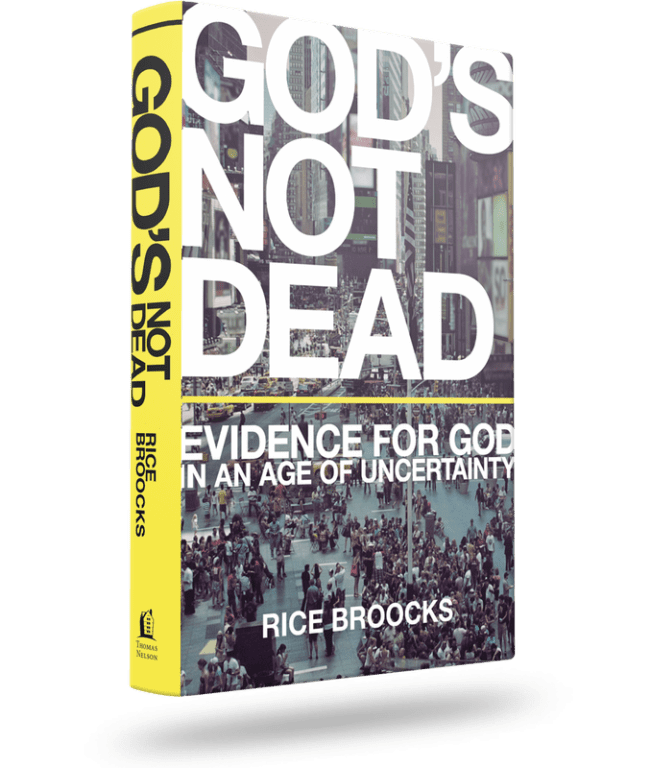 Some have said that the apologetics scenes are too short, and present a popularised and simplified view of the arguments. This is not a training video, it is a work of entertainment. The film should help Christians who may not even really be aware of apologetics to realise that there are strong reasons to believe. The hope is that it will also prompt them to want to find out more about how to defend the faith. To help in this quest Christians should get ahold of the book God’s Not Dead, which is not a novel, but instead serves as a great introduction to modern apologetics, and the arguments in the movie were all taken from that book.
Some have said that the apologetics scenes are too short, and present a popularised and simplified view of the arguments. This is not a training video, it is a work of entertainment. The film should help Christians who may not even really be aware of apologetics to realise that there are strong reasons to believe. The hope is that it will also prompt them to want to find out more about how to defend the faith. To help in this quest Christians should get ahold of the book God’s Not Dead, which is not a novel, but instead serves as a great introduction to modern apologetics, and the arguments in the movie were all taken from that book.
One of the highlights of the debate scene is when John Lennox is quoted contradicting Stephen Hawking. He says
“Nonsense remains nonsense, even when talked by world-famous scientists.”
The argument behind this quote is explained in much more detail in Lennox’s book God and Stephen Hawking, which is featured on the UK resources page for God’s Not Dead.
Concedes too much to evolution?
Some have been critical of the way that Josh for the purposes of the debate accepts scientists arguments for the age of the universe, evolution, and the Big Bang. For some this is simply a compromise too far. But there is a broad spectrum of opinions among Christians about the appropriate response to these questions. And in any case, in a debate like this, to meet unbelievers where they are and lead them to the idea of an intelligent creator as the source for the universe is surely the wisest approach.
Stereotypical characters?
 Some argue that the characters in this film are taken too the extreme, and are hence a bit unbelievable. Movies often use exaggeration to make a point, and I think God’s Not Dead does this skilfully.
Some argue that the characters in this film are taken too the extreme, and are hence a bit unbelievable. Movies often use exaggeration to make a point, and I think God’s Not Dead does this skilfully.
The point of a film is not to be as close to daily life as possible: that would be very boring, and would not communicate anything. What God’s Not Dead does so well in many cases is take behavioural traits that we see in our daily lives all too often, and present them in some cases taken to their logical conclusion. So instead of subtle discrimination, the atheist threatens the student that he will fail him.
What we see in the rich variety of subplots is actually almost every response to God. We see these responses often, and so everyone will be able to identify with at least one of the characters. I wanted to discuss each of the main subplots, and the key lessons I feel they demonstrate.
SPOILER ALERT stop reading here if you haven’t yet seen the film and don’t want to hear major plot features
Some have criticised the idea that the whole class would be converted by Josh’s arguments as unrealistic. In my view this misses the point totally. Firstly, the vast majority of both British and Americans do still believe in God. This statistic surprises many, because it is so “uncool” to talk about such faith. If Christians often struggle to defend their faith, and they do, how much more the silent majority who believe but are not sure in what.
The class was as a whole bullied into signing the pieces of paper which say “God is dead!” All that Josh does is awaken in them the desire to stand up to the professor rather than acquiesce. Actually, I can even imagine that some of the class are standing to declare, not that they personally believe in God, but that the idea of God is far from dead. Agnostics may have stood also. It was only after I had watched the film several times that I noticed that in fact at least one student did not stand up, so the “conversion” was not complete.
Interestingly, it is only the Chinese student who is portrayed as actually becoming a Christian as a result of Josh’s debate. Debates will often move people on, but not everyone will convert. Some have argued that the idea of an atheist Chinese student turning to Christianity is unrealistic. And yet, his story was based on the very real testimony of respected eye surgeon, Dr. Ming Wang.
 One of the most controversial subplots centres around Ayisha, a Muslim convert to Christianity. Some claim this is unfair to Muslims, as when her father discovers her new faith he slaps her and throws her out of the family home. To be clear, nobody is implying that all Muslims are like Ayisha’s father. There are many who support freedom of religion for all, and who would cite the Quaranic verse that “there shall be no compulsion in religion” Surah 2:256. But, there are also Muslims who do not tolerate conversion from Islam to any faith. For example, it was recently reported in Uganda, that “a Muslim Man Beat His Daughter To Death After She Converted To Christianity.”
One of the most controversial subplots centres around Ayisha, a Muslim convert to Christianity. Some claim this is unfair to Muslims, as when her father discovers her new faith he slaps her and throws her out of the family home. To be clear, nobody is implying that all Muslims are like Ayisha’s father. There are many who support freedom of religion for all, and who would cite the Quaranic verse that “there shall be no compulsion in religion” Surah 2:256. But, there are also Muslims who do not tolerate conversion from Islam to any faith. For example, it was recently reported in Uganda, that “a Muslim Man Beat His Daughter To Death After She Converted To Christianity.”
Actually the Muslim father in God’s Not Dead, taken as a whole, is portrayed sympathetically. His first scene is poignant as he explains his love for his daughter, and the challenge he sees in the family living out their faith in Allah in a hostile society. And immediately after assaulting and expelling his daughter, we see him collapse into tears of regret. The stability and peace of the World in the 21st century will depend on learning how both at home and globally people of different faiths and no faith can get along peacefully. We must all commit to work for true tolerance and understanding. May this film help encourage Christians to reach out to Muslims, befriend them, and discuss the similarities and differences between our faiths.
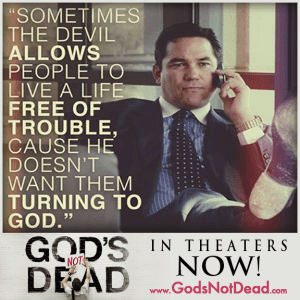 Growing up I used to enjoy watching Lois and Clarke, and so Dean Cain who played Superman in that series was the most recognised actor in God’s Not Dead for me. His character is an extreme version of the selfish businessman.
Growing up I used to enjoy watching Lois and Clarke, and so Dean Cain who played Superman in that series was the most recognised actor in God’s Not Dead for me. His character is an extreme version of the selfish businessman.
Rejecting God, he lives solely for himself. He has no time for his girlfriend when she is diagnosed with terminal cancer, or his mother who is suffering from dementia.
Although there are some shocking comments from this character which led to sharp intakes of breath by the audiences, selfishness is certainly something we all struggle with. Watch out for the scene where he finally visits his mother, it is a tear jerker.
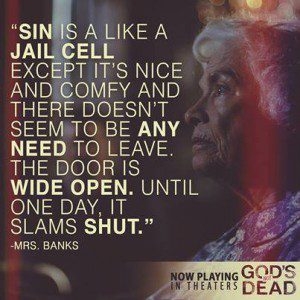 Another poignant subplot centres around a successful blogger who hijacks her targets for surprise interviews. Her world comes apart when she is diagnosed with cancer.
Another poignant subplot centres around a successful blogger who hijacks her targets for surprise interviews. Her world comes apart when she is diagnosed with cancer.
One of the band asks her “where do you get your hope from?” It is obvious the answer in truth is nowhere.
Cory Oliver plays the Atheist professor’s lapsed Christian girlfriend, and her sub-story provides a great opportunity to discuss the concept of being “unequally yoked” with friends who may be in a similar position (see 2 Corinthians 6:14).
The interaction between the two pastors in the movie is priceless. We see a very realistically somewhat disillusioned American church leader needing an African to bolster his faith. The harsh realities of the suffering that simply cannot be “magicked” away by faith are faithfully portrayed. But the simple faith of the gospel provides hope, comfort and joy.
If this movie introduces American Christians to a popular refrain “God is good. All the time” from our African brothers and helps us all to realise that we are part of the global family of God and can learn from each other it will have done well.
There are so many reasons to go and watch this film. If you are a pastor, or know a pastor, you should consider showing your church the trailer for this film, and organising a trip to watch it in your local cinema. You won’t be disappointed.


